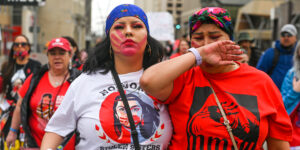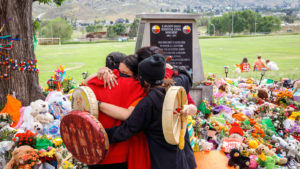When the Australian prime minister invites his countrymen to join him “on the right side of history” later this year, they will almost certainly decline. If the current polls are anything to go by, Anthony Albanese’s referendum on the creation of a parliamentary body to advise on matters affecting Aboriginal Australians and Torres Strait Islanders is on an inexorable path to defeat.
Advocates for the independent Indigenous Voice to Parliament body, upon whose shoulders the burden of colonial guilt weighs heavily, are perplexed. Who wouldn’t want to end the torment of the powerless and erase the nation’s shame, especially when the 24-strong panel’s considerations would be merely advice and not constitutionally binding?
Most of Australia, apparently. Talk of equity, inclusivity and compassion is failing to soften hearts. In February, support for the Voice was at 56%. A Newspoll survey in mid-July found support had slipped to 41%, compared to 48% for the No case.
Its supporters blame ignorance, disinformation and lingering prejudice. Yet the polling tells a different story, of revolt against what the American economist Thomas Sowell identified as “the vision of the anointed”, one that will be familiar to followers of the Brexit referendum. As with the UK in 2016, the Voice is popular in the metropolises of Sydney and Melbourne, but has failed to win support in the regions. It is favoured by millennials and Gen Z, particularly those with a university education; baby boomers and those even older will vote No by a large majority. Support splits along party lines: highest among Greens, but widely rejected by seven out of 10 Liberal and National voters.
Whatever the result, it is clear that the referendum won’t be the “unifying Australian moment” Albanese hoped for when he announced it at a national Aboriginal gathering a year ago. And faced with potential failure, his supporters have proved reluctant to understand how those who reject their modest proposal could be motivated by anything other than hate. “While it is not true to say that every Australian who votes No in the Voice referendum is a racist,” says columnist Niki Savva, “you can bet your bottom dollar that every racist will vote No.” Marcia Langton, a distinguished Melbourne-based Aboriginal leader, says it would be “terribly unfortunate” if the referendum were to sink into “a nasty, eugenicist, 19th-century style of debate about the superior race versus the inferior race”.
Yet the most commonly heard objection to the Voice is anything but discriminatory. At its heart, the notion of special treatment for anyone offends the Australian spirit of egalitarianism, hardwired in since the convict days. Every citizen stands on an equal footing regardless of why they came here. It makes no difference whether your Australian ancestry goes back 60 years or if you took the Citizenship Pledge 60 minutes ago. Here, no one gets special favours simply because of their race.
In the last referendum about the standing of Aboriginals and Torres Strait Islanders, which was held in 1967, Australians voted nine-to-one in support of amendments to remove the last vestiges of official discrimination against native people. Like the dismantling of the White Australia policy — a set of historic racist laws designed to limit non-European migration, the last of which was abolished in the Seventies — it was an affirmation that the state was blind to colour.
But campaigners for the No vote have argued that the referendum would reintroduce a racial element to Australian politics, granting special privileges to one group to the disadvantage of others. If there is to be a voice within government for Indigenous peoples, is it not also unfair to exclude the voices of other ethnic minorities? Why not appoint an Asian voice to parliament, a Greek voice, or even a Pommie voice, since immigrants from the UK have formed a relative majority of new arrivals since the early Sixties? Opponents fear that the Voice will effectively become a de-facto third chamber in the bicameral Parliament of Australia, one with political muscle over legislation if not a power of veto. They also fear the mischief that an activist Supreme Court might wreak in interpreting its output.
Most of all, opponents worry about what comes next. After all, the Indigenous Voice to Parliament could yet prove a mere staging post on the road to the more substantive structural reforms outlined in the “Uluru Statement from the Heart”, a 2017 petition by Australian Aboriginal and Torres Strait Islander leaders which called for separate sovereignty over land and reforms to address structural “powerlessness”. The petition has since risen to the status of a sacred document among Voice supporters, and its proposals have been accepted in full by Albanese. It describes an Indigenous Voice to Parliament as the first step towards a truth commission and a Makarrata Agreement — a treaty — empowering Aboriginal Australians to reclaim control over their economic and social destiny.
Some Indigenous activists would go further still, and are not afraid to say so. Thomas Mayo, a prominent Yes campaigner, says the Voice will be a vehicle to force non-Indigenous Australians to “pay the rent” for living on stolen land. In a series of tweets from 2020, Mayo claimed the “Blak [sic] rep body” would have the resources to demand “reparations, land back, abolishing harmful colonial institutions, getting ALL our kids out of prisons & in to care, respect & integration of our laws & lore, speaking language, wages back – all the things we imagine”. Unsurprisingly, Mayo’s various social media posts and similar intemperate remarks by other pro-Voice supporters have been widely used in the No campaign’s advertising script.
Yet perhaps the Yes campaign’s strongest card is the appalling poverty that blights the lives of roughly one-tenth of Australia’s Indigenous population. The most confronting poverty is found in remote communities that were given partial autonomy by well-meaning reformers in the Seventies. The disparities between indigenous Australians are as stark as they appear intractable. Australians have the eighth highest life expectancy in the world; 86 years for women, 82 for men. Life expectancy in 2018 for Aboriginal women in remote communities is 70 and 66 for men, roughly on a par with Ethiopia.
Decades of welfare and countless government programmes have barely shifted the dial. Indeed, the social fabric in remote Aboriginal communities has rapidly deteriorated. The prevalence of alcoholism, domestic violence and child sexual abuse is badly under-reported in the mainstream media; editors have self-censored for years to avoid stigmatising Aboriginal people. Few have taken the trouble to spend time in Australia’s own developing world to see the empty schools, the runny eyes, the overcrowded settlements beset by feral wild dogs. Those of us who have will never forget.
Supporters of the Voice, however, have conspicuously failed to explain how a Yes vote will change these conditions. Presenting contemporary welfare challenges as the legacy of colonialism and lingering prejudice had fallen out of fashion in Australia until the influence of the Black Lives Matter movement revived it. Even then, it failed to take off in the same way as in the US. Perhaps its lack of an empirical basis was more obvious in Australia. Is historical injustice causing higher rates of cardiac illness and cancer? Or might it be a tobacco consumption that is more than five times higher in remote Aboriginal communities (59%) than in the general community (11%)? Might the high incidence of kidney failure be related partly to patterns of alcohol consumption? Could higher rates of type-2 diabetes partly be due to poor diets?
Faced with such widespread cognitive dissonance, it is hard not to be reminded of Sowell’s empirically grounded arguments about the US Civil Rights movement: that the political advancement of an ethnic group does nothing to reduce social and economic disparity. That is an observable fact in Australia, where the political influence of Indigenous Australians has been steadily increasing since the late Sixties. The Aboriginal population is disproportionately represented on the floors of the Commonwealth Parliament, and the Aboriginal political class holds significant influence in the corridors of power and the media. Corporates have enthusiastically backed periodic reconciliation campaigns and the acknowledgment of the traditional owners of the land has become a secular prayer recited at the start of corporate meetings, uttered by airline stewards upon landing, and appended to corporate emails. Yet the gap between Indigenous and non-Indigenous Australians is barely closing.
There is little doubt that an Indigenous Voice to Parliament would enrich and empower the Aboriginal political class, giving them an even stronger hand on the levers of power. Every new inquiry, committee or compliance board established is a job creation scheme for a subset of Indigenous people who are suffering no apparent disadvantage themselves. Yet it will be a further blow for Indigenous people firmly grounded in the country, the “somewhere”, as opposed to the “anywheres”, in this debate.
In Australia as in America, the most grievous effect of insisting that everything boils down to race is the theft of agency from people who, by dint of their genetic inheritance, are considered incapable of changing their lives, for good or ill. Administering welfare in compensation will only make matters worse. As an increasing number of Australians plan to make clear, the tyranny of low expectations it breeds is anything but emancipatory.
Disclaimer
Some of the posts we share are controversial and we do not necessarily agree with them in the whole extend. Sometimes we agree with the content or part of it but we do not agree with the narration or language. Nevertheless we find them somehow interesting, valuable and/or informative or we share them, because we strongly believe in freedom of speech, free press and journalism. We strongly encourage you to have a critical approach to all the content, do your own research and analysis to build your own opinion.
We would be glad to have your feedback.
Source: UnHerd Read the original article here: https://unherd.com/




